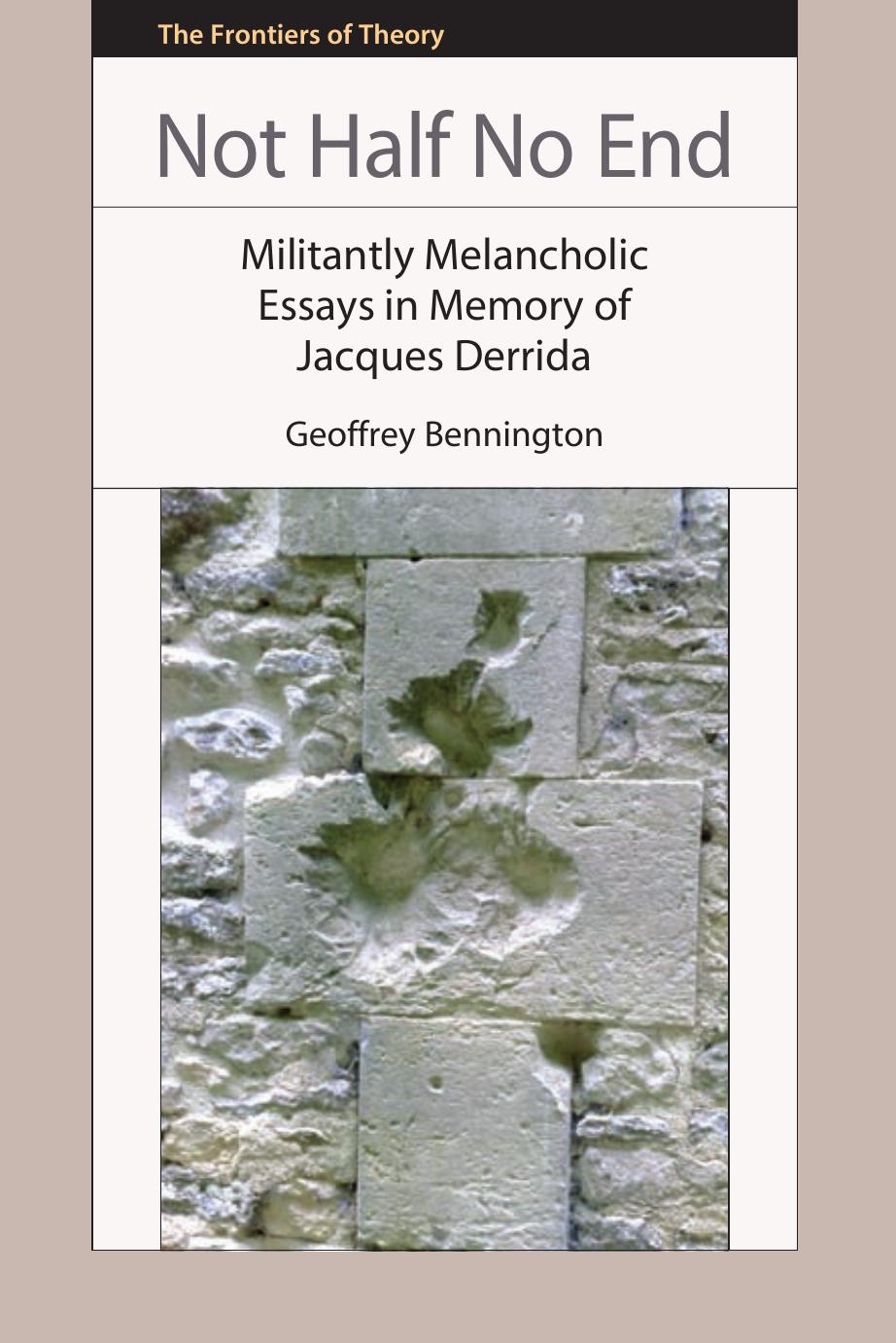Not Half No End: Militantly Melancholic Essays in Memory of Jacques Derrida by Geoffrey Bennington

Author:Geoffrey Bennington [Bennington, Geoffrey]
Language: eng
Format: epub, pdf
Tags: Art, Criticism & Theory, Literary Criticism, Caribbean & Latin American, Philosophy, Aesthetics
ISBN: 9780748639854
Google: mc3rwAEACAAJ
Publisher: Edinburgh UP
Published: 2010-09-15T21:25:08+00:00
The Limits of My Language
âThe limits of my language mean the limits of my worldâ, as Wittgenstein notoriously puts it in the Tractatus.1 My interest in this paper is not so much to discuss that assertion itself, as to wonder what to make of the notion of language having limits at all. What sense can we make of the expression âlimits of languageâ? And this question might itself divide into at least two sub-questions, namely: (1) what kind of limits does language have (assuming it has any)? and (2) does language even have limits?
It might seem at first as though language must have limits, and that those limits must be where it abuts onto âthe worldâ. Language âover hereâ, or so the thought would go, is separated from, but in some relation to, the world âover thereâ. That relation would be essentially, if we are to follow the tradition, the relation of reference, or at least possible reference. On this view the world, which intuitively existed long before language, sits there waiting, as it were, for language to arrive on the scene and to refer to it. In referring (or at least in successfully referring), language both recognises its limits and transgresses them, in the sense at least that it points beyond those limits (maybe even puts out âfeelersâ) to reality or the world beyond. On this simple but powerful view of language, reality, whether construed as empirical, as in Locke, or of some higher order, as in Plato, not only comes first in the relationship, but âwears the trousersâ, as J. L. Austin might have said. If I can quote David Pears characterising this view (as that of the Tractatus) in his magnum opus on Wittgenstein:
The idea is that in all our operations with language we are really running on fixed rails laid down in reality before we even appeared on the scene. Attach a name to an object, and the intrinsic nature of the object will immediately take over complete control and determine the correct use of the name on later occasions. Set up a whole language in this way, and the structure of the fundamental grid will inexorably dictate the general structure of the logical system.2
My intention is not to follow what happens to these questions in Wittgenstein, however, but to see how they fare in the work of Jacques Derrida. It might plausibly be thought, for example, and often indeed has been thought, that Derrida is proposing (however obscurely) a philosophy of language, and one that also attempts to produce a non- or anti-Platonist account of what holds language together in its relations with the world, once the Platonic presumption has been refused, albeit not an account that obviously turns to what Pears calls âthe stability of our own practicesâ to do the trick.3 It would also have in common with Wittgenstein that it gives rise to what Pears calls âthe characteristic intellectual giddiness of withdrawal from Platonismâ. On this view of Derrida proposing a philosophy
Download
Not Half No End: Militantly Melancholic Essays in Memory of Jacques Derrida by Geoffrey Bennington.pdf
This site does not store any files on its server. We only index and link to content provided by other sites. Please contact the content providers to delete copyright contents if any and email us, we'll remove relevant links or contents immediately.
The European Opportunity by Felipe Fernández-Armesto(572)
The European History Highway: A Guide to Internet Resources by Dennis A. Trinkle Scott A. Merriman(542)
Morgan Kaufmann Digital Watermarking and Steganography by Ingemar Cox Matthew Miller Jeffrey Bloom Jessica Fridrich Ton(529)
The Seven Wonders of the Ancient World by Michael Denis Higgins(527)
Hyperculture by Byung-Chul Han(512)
European Security without the Soviet Union by Stuart Croft Phil Williams(511)
European Security in a Global Context by Thierry Tardy(507)
The Routledge companion to Christian ethics by D. Stephen Long Rebekah L. Miles(507)
Get Real with Storytime by Julie Dietzel-Glair & Marianne Crandall Follis(445)
Hudud Al-'Alam 'The Regions of the World' - a Persian Geography 372 A.H. (982 AD) by V. V. Minorsky & C. E. Bosworth(440)
Tibetan Studies in Comparative Perspective by Chih-yu Shih Yu-Wen Chen(437)
Gorbachev And His Generals by William C. Green(430)
Governance, Growth and Global Leadership by Espen Moe(428)
CliffsNotes on Fitzgerald's The Great Gatsby by Kate Maurer(414)
How Languages Are Learned 5th Edition by Patsy M Lightbown;Nina Spada; & Nina Spada(410)
The Egyptian Economy, 1952-2000 by Khalid Ikram(389)
The Oxford History of the World by Fernández-Armesto Felipe;(388)
Oral Poetry and Narratives from Central Arabia: The Poetry of Ad-Dindan : A Bedouin Bard in Southern Najd (Studies in Arabic Literature, Vol 17) (English and Arabic Edition) by P. M. Kupershoek P. Marcel Kurpershoek(368)
The Oxford Handbook of the Incas by Sonia Alconini(367)
